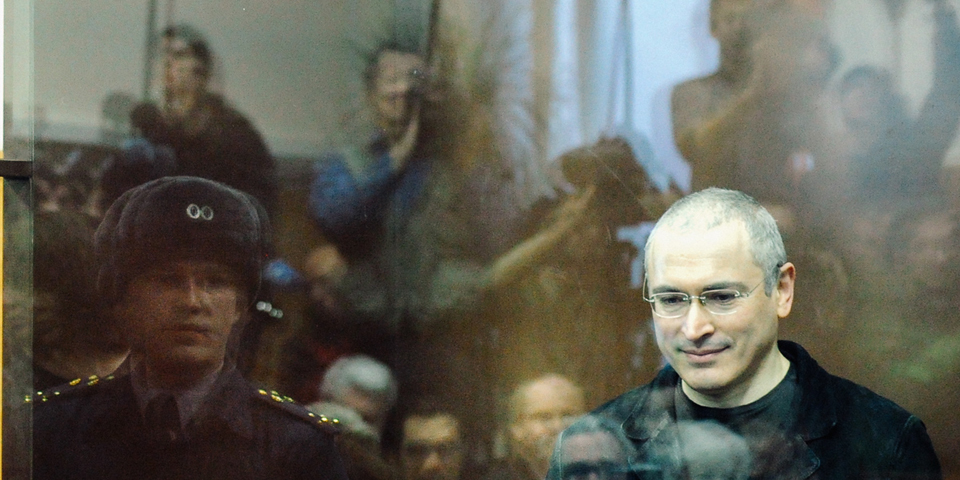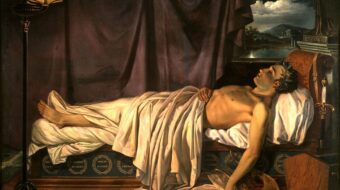
Documentary filmmaker Alex Gibney’s latest entry takes on the transition from the USSR to shock capitalism, the bargain basement selloff of the Soviet people’s hard-earned material infrastructure to insider cronies who in short time became billionaires, and the way those nouveaux riches became firmly entrenched in an authoritarian oligarchy led by Vladimir Putin.
One of those men, Mikhail Khodorkovsky, no better nor worse than the others, started asking impertinent questions; he was prosecuted on phony embezzlement and tax charges, sent to prison in Siberia for ten years, and is now, from his exile in London, one of Russia’s most prominent agitators for democratic governance.
The film title Citizen K inevitably recalls such other films about transparency in government, or the lack thereof, as Citizen Kane, a fictionalized life of newspaper titan William Randolph Hearst, and Citizenfour, a documentary about the exploits of the conscientious IT analyst Edward Snowden, still trapped in Russia for fear of severe punishment if and when he ever returns to the U.S.
The film takes us from the Boris Yeltsin years to the present, with Khodorkovsky himself serving as guide and interpreter of the tumultuous events of the past thirty years of cataclysm in Russia as the country jumped off a cliff into the void. Interspersed with interviews with the Great Man himself are numerous business partners, academics, activists and journalists, as well as historical footage illuminating the inflection points in this corrupt saga.
From his start in commercial banking, the brilliant and ruthless young upstart soon joined an elite group of oligarchs who came to control half of the Russian economy. Khodorkovsky got heavily into fossil fuel development, taking over Yukos, the oil empire that was a former state-owned enterprise.
Anyone who rose to such dizzying heights in those years was surely complicit in any number of serious lapses of discretion, not to say lethal crimes. If getting filthy rich was but a rollercoaster game to men like him, well, the sport could get deadly as uncooperative players soon found out. Khodorkovsky could legally return to Russia but he would be subject to a new trial on a murder charge.
For a period in the 1990s Russia became the murder capital of the capitalist world. The legal structure fell far behind the bitter and fast-moving realities on the ground as Wild West capitalism attracted a host of shady personalities.
“Power,” Khodorkovsky says, in an epigram that seems to sum up the whole socialist collapse as much as the present-day situation, “is a question of how much people are willing to defend it.”
The social compact, consolidated under Vladimir Putin, came to be defined as an agreement that the oligarchs not interfere with politics, in exchange for which they would be given free rein to do as they pleased without consequence. In one demonstration of his authority, when privately owned TV channels raised criticisms of the government at the time the submarine Kursk sank, an embarrassed Putin simply ordered a government takeover of the stations.
By such measures, Putin appealed to the mass public that had taken a serious hit with the fall of socialism, in lost jobs, security, housing, healthcare, etc., and saw in the autocrat a kind of new Stalin who would restore Russia’s rightful place in the world.
When Khodorkovsky started taking an interest in politics, Putin did not hesitate to make life difficult for him. Yukos was taken over and eventually became the re-nationalized Rosneft, which is today a leading player in the energy market. The former oil magnate served nine years at a prison camp near the Chinese border, and when the end of his sentence was coming near, he was put on trial again, now on charges of “stealing oil.” (Where did he put it? curious minds want to know.)
The show trial was patently staged in order to produce a new verdict that would keep Khodorkovsky in prison for 13 more years, But by now a new generation of sympathizers had arisen, fed up with a country not one of laws but of dictatorship. Protesters could begin to imagine a Russia without Putin.
By the time of the 2014 Sochi Winter Olympics, Putin had been pressured to ease up on the persecution of his enemies, and he set a sizable number of prisoners free, including Khodorkovsky, who heard about it on TV. In his case, the condition was that he go abroad, thus becoming an international symbol of the strength of civil society.
Citizen K is totally riveting from beginning to end, assuming a viewer has some interest in the subject. It’s documentary filmmaking at its best, without judgment as to the causes of the Soviet collapse in the first place. One need not accept Mikhail Khodorkovsky as Russia’s savior to appreciate the strange course of his life that has led him to where he is today.
Yet even the institution of “bourgeois” democratic rights, which Russia has never enjoyed at any time in its history, would be a historic advance, and to that extent Khodorkovsky has to be considered as a leader of the forces for good. In the meantime, Vladimir Putin shows few signs of surrendering the reins of power. This story is still playing out and is nowhere near the end.
The trailer can be viewed here. Journalist Christine Amanpour interviews Alex Gibney and Mikhail Khodorkovsky here.












Comments